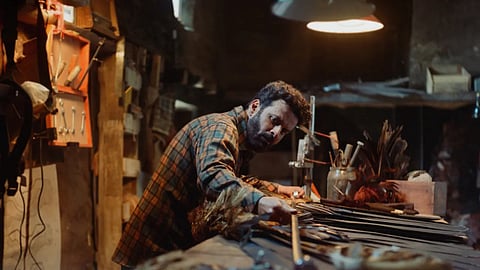Jugnuma Movie Review: Manoj Bajpayee-starrer is a magical flight with minor turbulence
Jugnuma(3 / 5)
“Many years later, as he faced the firing squad, Colonel Aureliano Buendía was to remember that distant afternoon when his father took him to discover ice.” This haunting line marks the beginning of Gabriel García Márquez’s seminal novel One Hundred Years of Solitude. The book frequently popped in my mind while experiencing Thithi director Raam Reddy’s sophomore feature Jugnuma, maybe because both deal with magic realism. The line can be tweaked if Jugnuma had to have an alternate beginning: “Many years later, on one nostalgic evening, little Juju was to remember that distant afternoon when his father taught him how to fly.”
Cast: Manoj Bajpayee, Deepak Dobriyal, Priyanka Bose and Tillotama Shome
Written and directed by: Raam Reddy
Rating: 3 stars
The dad is Dev (Manoj Bajpayee), Juju (Awan Pookot) is his youngest and the flying is not metaphorical. On some days, Dev can be spotted treading through his vast mountain estate, greeting village folk who don’t even bat an eyelid at the wings he wears like a backpack. Later, he jumps off a cliff for his regular flight. During its runtime, Jugnuma plants a lot of questions it might not provide definite answers to. The film functions like an old grandma’s tale, where magic often overpowers meaning. It still is a bewitching experience, set in a world where literal and literary are interchangeable. Jugnuma can best be described as an undecipherable morning dream, which lingers in your head long after.
The year is 1989. Dev and Nandini (Priyanka Bose), along with their children Vanya (Hiral Sidhu), Juju and two alsatians reside in a hill house, situated in an expansive Uttarakhand estate, mystically named ‘teen-pahad (three mountains).’ The family spends its afternoons scattered. Boarding school-returned Vanya looks for freedom as she rides a horse through the forests, Juju toys around with a cam-corder, Nandini engrosses herself in knitting while Dev works on his wings in the outhouse. Together at night, they all lie down on the grass, looking for patterns in the stars. Their days of serenity are blotted when one day Dev discovers a burnt tree. Later, it mushrooms into five, and soon after he finds himself, along with his manager (Deepak Dobriyal) and the estate workers, trying to tame an inferno. Who is behind these mysterious fires? Suspects aplenty. Is it the locals, miffed over the use of pesticides? Or the local patwari (land registrar) whom the villagers look at suspiciously? Who is this horse nomad, who can converse with Vanya without uttering a word?
Jugnuma unfolds like a fairytale (It even begins with the text on screen ‘Ek samay ki baat hain…(Once upon a time)). Shot on 16mm film, the feature has a grainy, nostalgic texture which lends itself well to the themes. Sunil Borkar’s cinematography is calm and cozy, giving us a carousel of warm imagery like the Milky Way galaxy in the night sky or a village woman offering prayers at a small temple surrounded by towering firs. The film constantly feels like it’s trying to wrap the viewer in a velvet comforter. It imparts the feeling of sitting by the bonfire on a winter night.
But the night is also full of questions. Jugnuma often interchanges art with the abstract and if you are a cinegoer who expects their films to settle everything by the end, you might be disappointed. Personally, I would have liked the film to be involved in the central mystery more and through it explore the themes and not the other way round. There are gaps in the film, which are often lazily filled with mystical explanations. But it’s not just about logic, the emotional curve can also feel patchy. Nonetheless, Raam Reddy’s assured direction soldiers the film along.
Although Manoj Bajpayee doesn’t get a lot to do, he ensures that his acting prowess doesn’t take away from the enchantment of the film. I enjoyed Deepak Dobriyal in the role of Dev’s manager. His simple, day-to-day acts of watering the plants or trimming his moustache gives a lot of insight into his character. Tillotama Shome’s presence is brief but she manages to impress with just one scene. Her Kumaoni accent is so on-point that I forgot she is a Bengali.
Jugnuma moves somewhere between miracle and memory. It’s a believe-as-you please visual marvel, better enjoyed if you just let it wash over you. If you go for a show and the illusionist starts floating in the air, somewhere you know there is got to be a more scientific explanation. You can either squint your eyes, trying to find the thread-thin suspenders on his shoulders or you can marvel at how he juggles colourful balls mid-air. Magic exists, if you believe it does.

